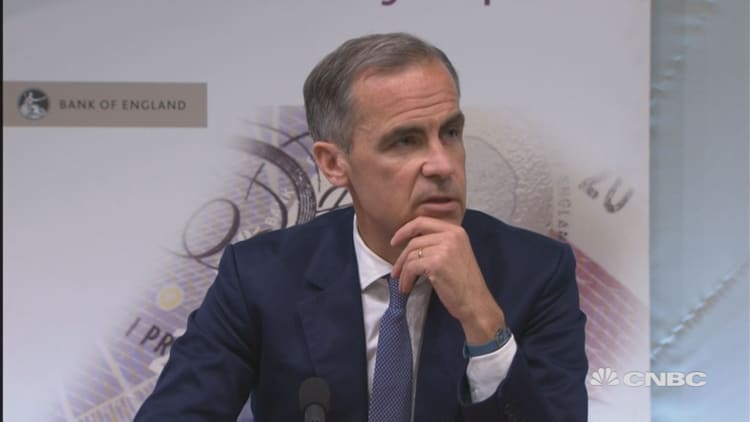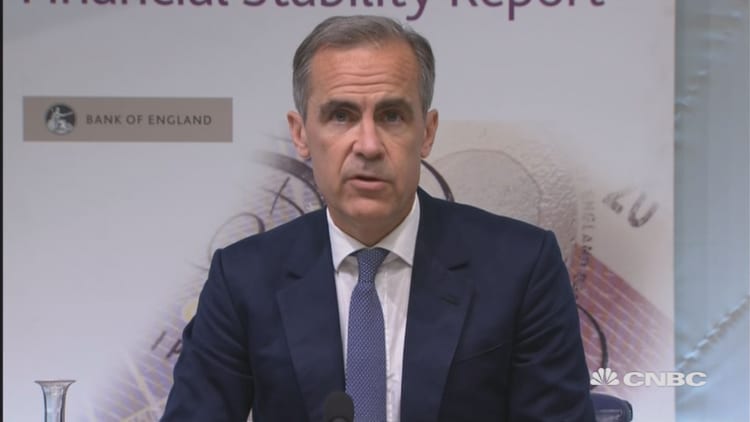


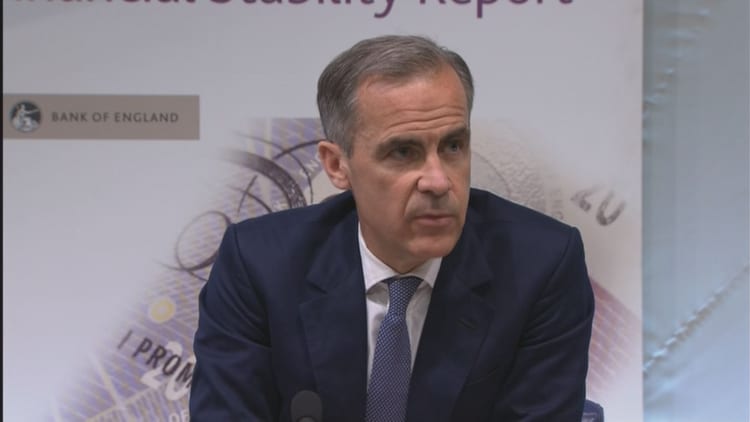
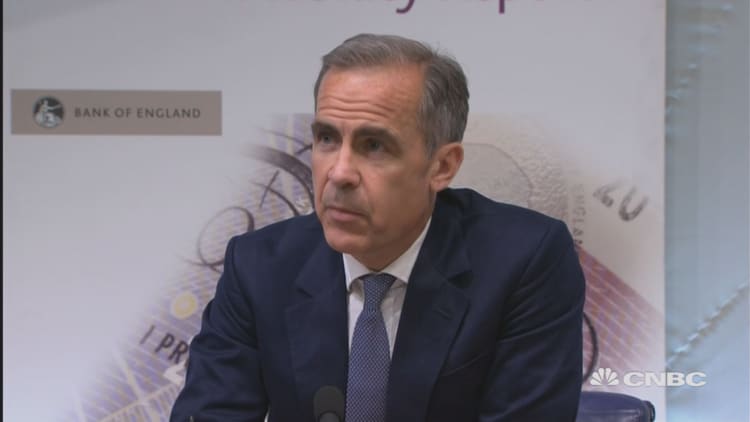
The Bank of England (BoE) announced a new measure on Tuesday to soften the financial fallout from the U.K.'s vote to leave the European Union (EU) last month.
The counter cyclical capital buffer rate for U.K. banks was cut with immediate effect to 0 percent from 0.5 percent of financials' U.K. exposure, the BoE said on Tuesday in its biannual Financial Stability Report — the first to be published since the Brexit vote. This will reduce regulatory capital buffers by £5.7 billion ($7.5 billion), raising banks' capacity to lend to households and businesses by up to £150 billion.
"Those U.K. households and businesses who want to seize viable opportunities … can be confident that they will be supported by the financial system," Bank of England Governor Mark Carney said at a media conference on Tuesday. He emphasized that capital buffer measures were only to support domestic banks.
Following the announcement, the U.K. Treasury issued a statement saying the country's main lenders had agreed to use the extra capital to support lending to the real economy.
Meanwhile, the BoE said in the report that risks identified in March ahead of the referendum had "begun to crystallize."
"The current outlook for U.K. financial stability is challenging," the Financial Stability Report said.
"There will be a period of uncertainty and adjustment following the result of the referendum. It will take time for the United Kingdom to establish new relationships with the European Union and the rest of the world. Some market and economic volatility is to be expected as this process unfolds."
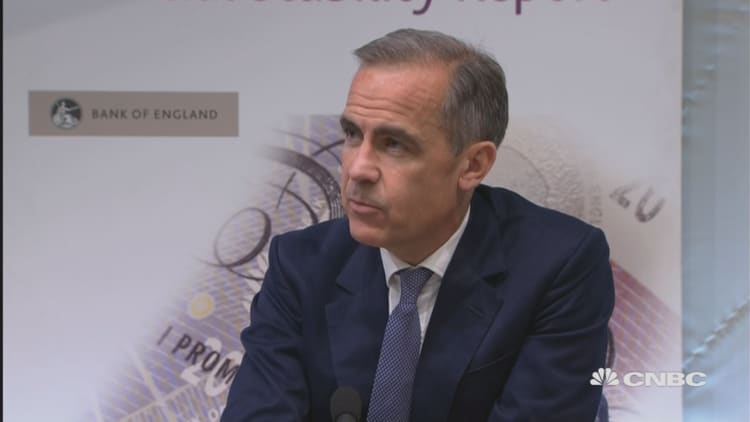
Challenges ahead may include lower investor demand for U.K. assets, the BoE said. A decline in capital inflows could be associated with downward pressure on the exchange rate and tighter funding conditions for U.K. borrowers. It might also rock the U.K. commercial real estate market, which has previously experienced strong inflows from overseas. Foreign inflows of capital to U.K. commercial real estate fell by almost 50 percent in the first quarter of 2016, the BoE said.
It also warned that the U.K.'s highly leveraged households might struggle to repay debts should employment and income growth fall in the months following the referendum — as widely warned. Last week, the BoE announced it would extend its indexed long-term report operations on a weekly basis until the end of September 2016 to provide extra liquidity insurance to banks.
"We have been concerned for some time … about the interplay between high levels of personal indebtedness and the housing market," Carney said at the news conference.
Sterling edged higher after the release of the report on Tuesday morning, but hit a new 31-year low against the U.S. dollar later, briefly falling below $1.30.
Shares of U.K. banks like Barclays surged higher after the BoE announcement.
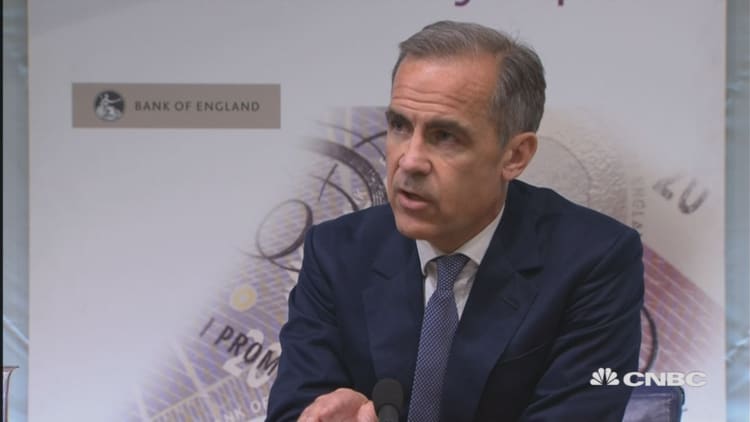
Rapid credit growth in China
Outside of the U.K., the BoE flagged rapid credit growth in China as a risk to financial stability, along with a decline in global investors' risk appetite and further appreciation in the U.S. dollar.
"Although spillovers to date have not been widespread, a prolonged period of uncertainty associated with the referendum could affect the global economy, particularly the euro area," the BoE added.
The 19-country euro zone accounts for around two-fifths of U.K. trade and around one-third of U.K. foreign direct investment, the BoE said — although Brexit campaigners say the U.K.'s trading links with countries outside Europe will strengthen as a result of the vote.
Major U.K. banks' exposure to the euro area amount to around 200 percent of their core equity capital, the BoE said.
Shares of banks headquartered in the euro zone fell sharply in the wake of the vote. The equity prices of banks in Spain and Italy — which are struggling with still-large debt piles — fell by 15 percent and 27 percent respectively in the week after the referendum, according to the BoE.
European stock indexes
European markets
Carney reassurance
Shares of FTSE 100-listed banks Barclays, RBS and Lloyds Group fell by double-digit percentages on the Friday following the referendum These banks retain a strong focus on the U.K. — unlike rival HSBC, which has a major Asia base, and posted smaller losses.
Carney sought to reassure investors on the day, pledging to provide an extra £250 billion ($333 billion) in liquidity if necessary. He insisted U.K. banks were well funded, in a message that was taken up by U.K. Finance Minister George Osborne on Monday.
"We are not today talking about a banking crisis, despite a very significant adjustment in financial markets," he told parliament, attributing this to tougher capital requirements for banks since the global financial crisis of 2007-08 and stronger oversight of the banking system since the BoE was placed in charge.
Major U.K banks' aggregate common equity tier 1 ratio — a measure of banks' resilience — reached 12.6 percent by the end of last year, the BoE said in March.
Carney added on Tuesday that U.K. banks currently held more capital than they needed. "The market agrees with us," he said, highlighting the rally in U.K. gilts since the referendum.
UK Gilts
U.K. Government Bonds (GILT)
Knock to GDP?
The bank is seen cutting the U.K.'s growth forecast in the wake of the Brexit vote, but the exact details will not be known until August when it publishes its regular inflation report.
On Tuesday, Carney reiterated the likelihood of a "material slowing" in the U.K. economy.
S&P Global Ratings forecast on Monday that Brexit would knock U.K. GDP (gross domestic product) by 1.2 percent next year and 1.0 percent in 2018. The estimate assumes access to the single market is maintained in both years and financial turmoil is checked. It also assumes the Bank of England cuts interest rates to zero from 0.5 percent by the end of the year and restarts its quantitative easing program in 2017.
"It is extremely important any monetary action is well-aimed… that it focuses on the domestic economy," Carney said on Tuesday.
"We are really thinking through the potential consequences, intended and unintended and net, of any actions," he later added.
